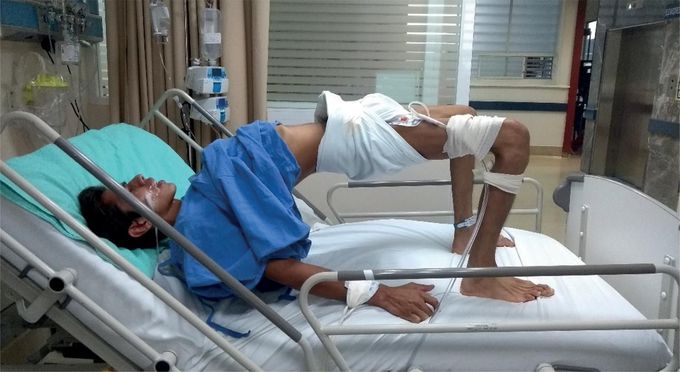


OPISTHOTONUS
Opisthotonus is a type of abnormal posture where the back becomes extremely arched due to muscle spasms. The condition is usually a sign of serious brain conditions, such as meningitis,tetanus, and trauma. Opisthotonos is a specific abnormal posture associated with conditions and injuries that impair brain and muscle function. The characteristic symptoms of opisthotonos are a severely arched or curved spine and head and heels that tilt backward. Though relatively rare, the condition is usually a symptom of severe neurological conditions that are life threatening and require medical care. Opisthotonos mostly impacts infants and young children, though it can occasionally affect adults. Symptoms Opisthotonos causes the back to become extremely rigid and curved or arched. The heels and head usually bend or flex backward as far as possible in response. If someone is on their back, they will arch upwards, forming an n-shape. In this position, the back usually lifts the back off floor or mattress to some extent. The arms also bend towards the body. In some cases, the head and lower body may be the only part of the body to keep in contact with the ground. If someone is on lying on their stomach when opisthotonos occurs, they will bend inward creating a u-shape. The legs and arms usually reach backward and upward. If the condition occurs when someone is lying on their side, the arching will form a c-shape. The person's knees bend, and their arms either bend in or extend straight out. In this position, the backward arching of the neck may be more noticeable or severe. Aside from these postural symptoms, the signs of opisthotonos vary depending on the cause. Symptoms that may accompany opisthotonos and require emergency care include: trouble breathingdifficulty swallowingrapid heart ratea bluish tone in the fingers and toesstiff jaw, neck, and abdominal musclesextreme pain and soreness in the neck, shoulders, and muscles that surround the spinehigh feverconvulsionsuncontrollable vomitingreduced alertness or response timedilated pupils or vision problemsextreme and unexplainable exhaustion Because the condition mostly affects infants and young children, these symptoms may be harder to pinpoint. Uncontrollable, persistent crying with muscle spasms may be a sign of opisthotonos. Infants may sleep more than usual but are restless, continually waking to adjust or find a more comfortable position. Tests used to diagnosis the causes of opisthotonos include: complete blood and urine testsmagnetic resonance imagining (MRI) of the brainelectrolyte testslumbar puncture (spinal tap)cerebrospinal fluid (CSF) culture testcomputed tomography (CT) scan

